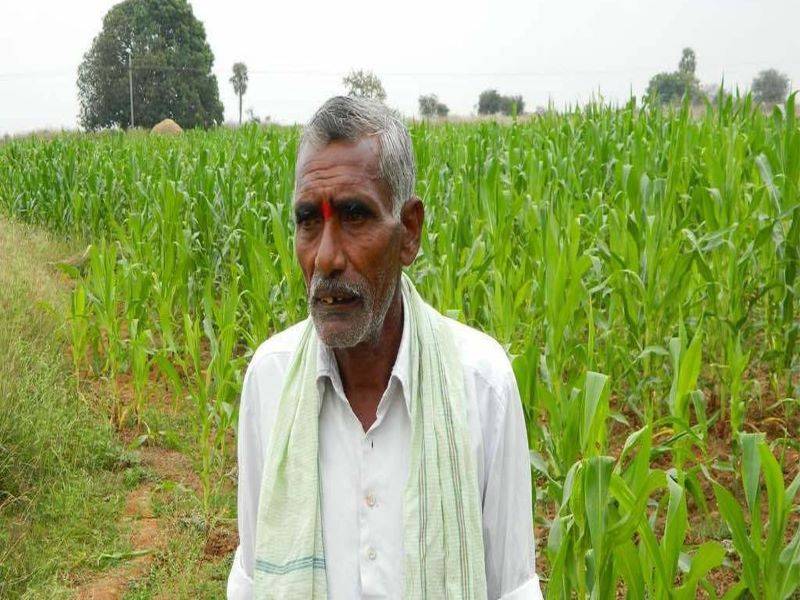
started Natural Farming, now called as Zero Farming, in his farmland has become role model of excellence for the whole state of Telangana. He started the organic farming movement in the village with the help of a non-governmental organisation, CROP (Centre for Rural Operations Programmes Society) which has inspired all the 52 families in the village and they shifted to natural farming, without using Ponnam Mallaiah, a 76-year-old farmer from Enabavi village of Warangal district, Telangana, who pesticides or chemicals not only this now many farmers of the state are following him up. His efforts have also made Telangana become the first organic village in the way of natural farming.
Mallaiah started the practice of Zero Farming from the last 20 years. He started this practice because when he saw increased the application of chemical fertilisers and pesticides, his yield increased. But in subsequent years, while the input burden kept increasing; neither his yield nor his income grew. That is when he realised what his grandfather used to tell him was true: "This is a slow poison. Don't succumb to it.'' So he decided to shift to chemical-free agriculture and adopted natural farming.
What is Zero Budget Natural Farming and why we need this innovation?
It is a farming practice that believes in the natural growth of crops without adding any fertilizers and pesticides or any other foreign elements. If we look at the witnessed what so-called technological revolutions in terms of fertilisers and chemicals, and even those high yield seeds found to be useless after an over a period. The fertiliser spoiled soil over the decades. The input cost increased enormously and returns were very discouraging. For example, Warangal district that shifted in a big way to a commercial crop like cotton witnessed the highest number of farmer suicides, accidental deaths due to pesticide exposure, agricultural indebtedness and distress due to the vagaries of weather and markets.

Methods followed by Ponnam Mallaiah for Natural Farming:
-
He used intercropping to control pests which have improved soil fertility and make farming profitable and sustainable.
-
Use of pheromone traps in our fields apart from the regular funnel-shaped contraption, even bottles are also used to trap pests along with training their children to identify pests and diseases.
-
Sometime neem seed extract, vitex leaf extract, chilli garlic extract to manage pests and diseases. (In the last 15 years there is not an outbreak of pink bollworm in spite theses farmers use non-BT cotton.)
-
Make their compost from all plant residues, use tank silt every four years and even use the waste from their poultry in the backyard.
-
Cow dung and cow urine collected from the cowshed and stored to make bio manure and Vermicompost.
-
Even alternated the use of synthetic urea with Azolla, a fern-like plant, as bio-fertiliser in their paddy fields which spreads rapidly and curbs the growth of harmful weeds.
-
Use Jeevamrutham and Panchagavya as growth promoters. For example, Panchagavya is prepared by combining cow dung, urine, milk, ghee, and curd. It improves the taste, colour, and texture of vegetables and fruits. Whereas Jeevamrutham is prepared with 10 kg of cow dung to 200 litres of water with powdered jaggery and chickpea flour all mixed well and leaves it for fermentation for two days.
Organic farming is a bit intensive, and when the farmers don’t get good remuneration for their produce, they feel disheartened and tend to follow easy ways of using chemicals. So, when they try to drop out, Ponnam Mallaiah with others talk to them, help them manage their crops and bring them back onto organic farming again.
Today it is a model village and knowledge centre for everyone who visits it from fellow farmers from different parts of India to agricultural scientists, officers, and experts. These farmers have opened cooperatives and later on merge under a single federation called the Sahaja Aharam Producer Company to sell their products to consumers. All the member-farmers are small or marginal farmers, who come with an output of 2.5-7 quintals, earning an additional income of Rs 2,500-7,000. Villages around Enabavi, like Manikyapuram, Siripuram, Kallem have also adopted this method.
The effort of Ponnam Mallaiah was so inspiring that the village got worldwide attention and he was invited in Australia, America and Sri Lanka to share his experience of farming. Enabavi village was declared a fully organic and chemical-free village in 2016. Now the Rice, wheat, cotton, chillies, pulses, oilseeds, millets and vegetables are being grown by these small farmers in drought-prone Jangaon district of Telangana is being sold in Singapore, Hyderabad and also at the local markets and even international agricultural companies started visiting the village and studying their methods.










